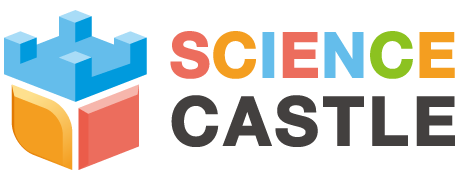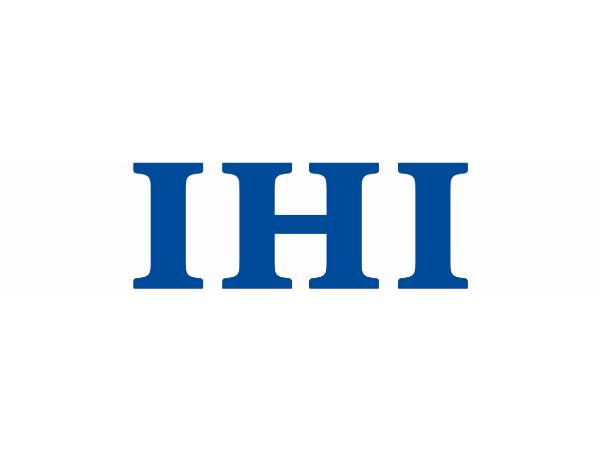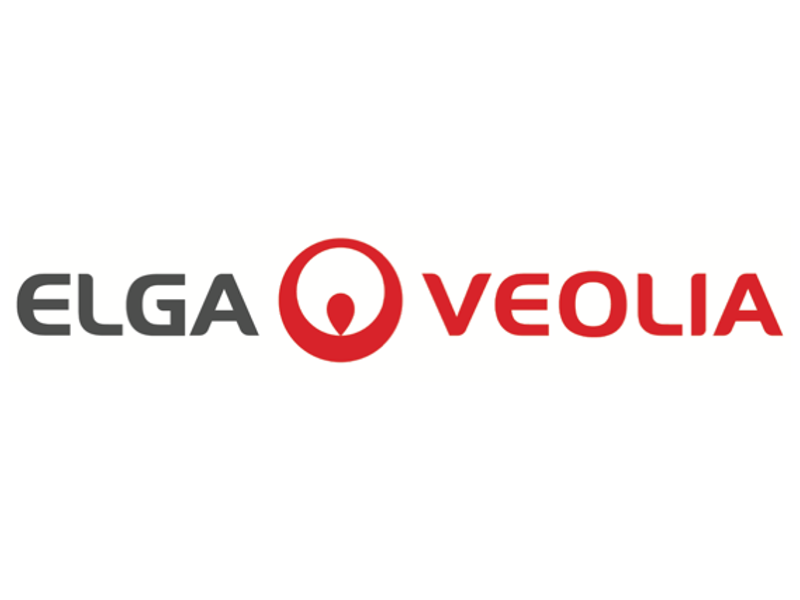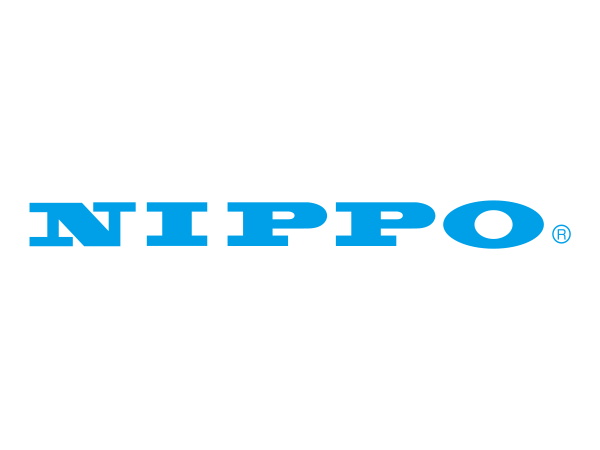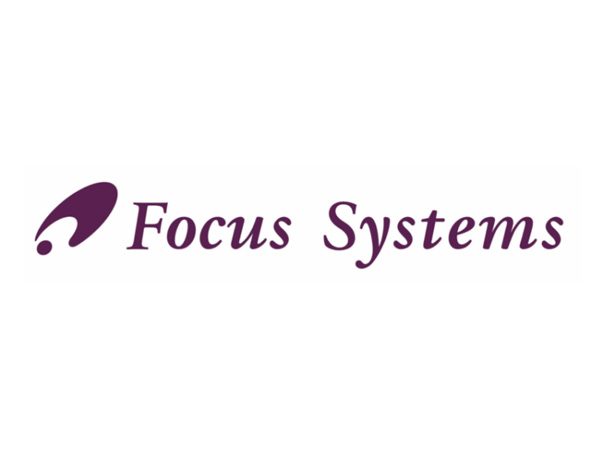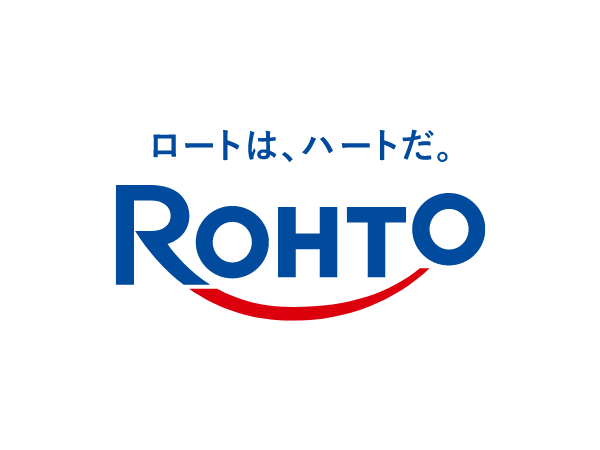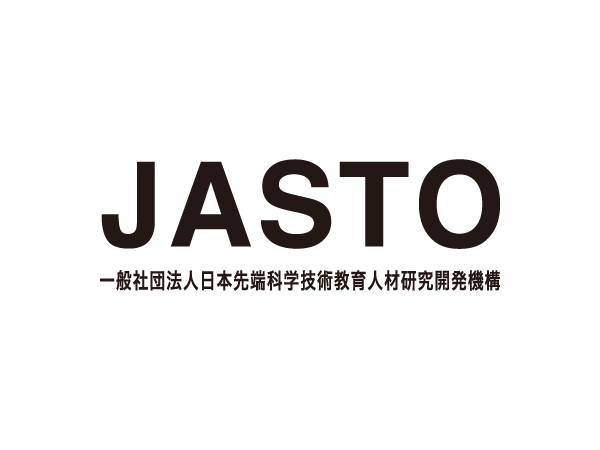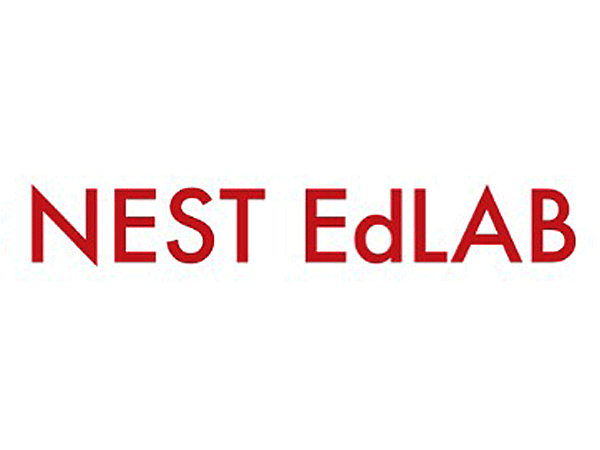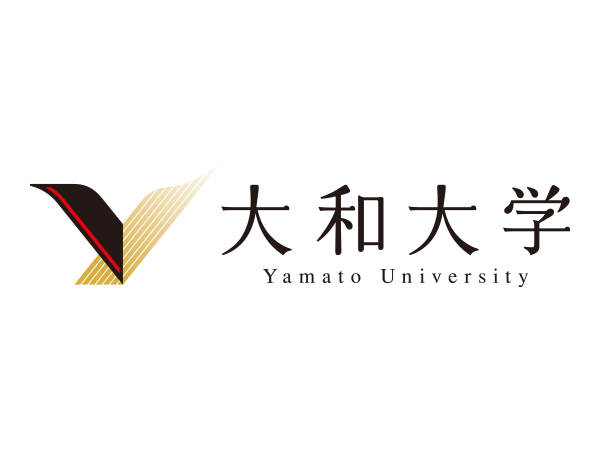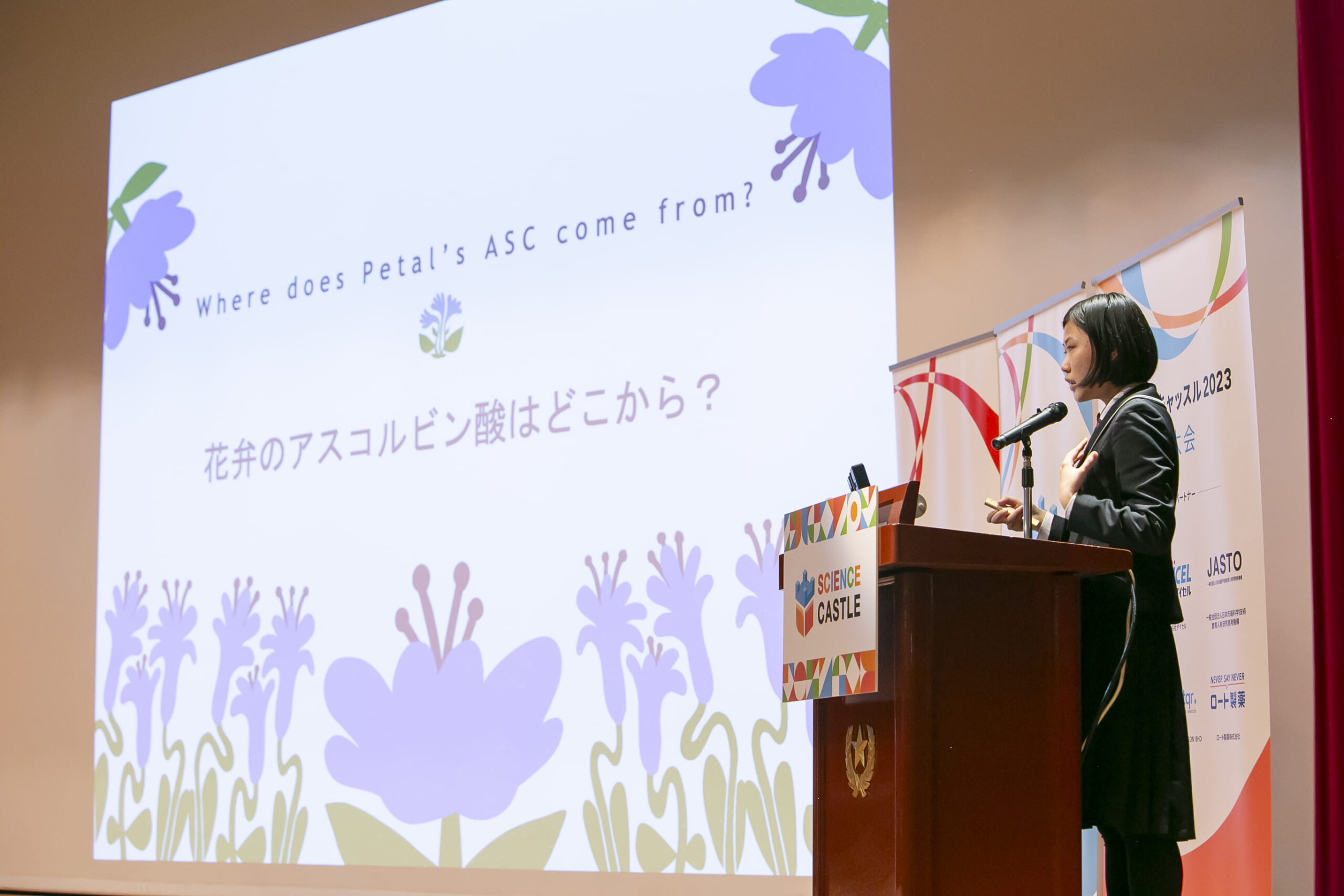
Science Castle 2024 Osaka-Kansai
Daiwa University, Osaka Suita Campus (Arena and F Lecture Building)*Parking is not available. Please use public transportation.
Greetings fellow Young Researchers from Asia!
This year marks the 13th anniversary of the Science Castle, which began near Osaka Castle in 2012.
Science Castle 2024 Osaka-Kansai is a conference to create a "super high school-level research community" consisting of 12 oral presentations and 80 posters. Selected presenters are invited to listen to their presentations and receive guidance and encouragement from research coaches and others while making horizontal connections in a group seminar format (online). In recent years, the contestants, partner companies, and RIVANES have held a "Future Workshop" after the competition to support teenage researchers in enriching their ideas.
Please see the entry page below for details.
URL:https://s-castle.com/entry/
Outline of the Event
- Event Name
- Science Castle 2024 Osaka-Kansai
- Date and Time
- Saturday, December 21, 2024 09:30-18:00
- Abstract Submission
- Oral presentations...Applications are now closed.
Poster Presentations...Applications are now closed. - Venue
-
Daiwa University, Osaka Suita Campus (Arena and F Lecture Building)
*Parking is not available. Please use public transportation.
2-5-1 Katayama-cho, Suita-shi, Osaka ACCESS - Organizer
- Leave a Nest Co., Ltd.
- Target Participants
- Presenters: Next-generation researchers in their teens, such as junior high and high school students
Visitors: Junior high school students, high school students, school teachers, graduate students, university researchers, companies, general audience, etc.
All visitors other than presenters are required to apply for admission in advance.
Visitor Application Form:https://id.lne.st/project/s-castle2024_audience/regist/basic_info/1
timetable
| Venue | Main Venue (Arena) |
Planning Venue (F Lecture Bldg.) |
| 9:00 | inauguration | |
| 9:30 | opening ceremony ⚫︎ Partner Greetings |
|
| 9:50 | keynote speech | |
| 10:15 | oral presentation |
|
| 13:15 | lunch break | |
| 14:00 | Poster Presentations (first half, odd numbers) | Special Session Go To Asia: A New Experience |
| 15:00 | Poster Presentations (second half, even numbers) | |
| 16:00 | special project | |
| 17:00 | Awards Ceremony and Closing Ceremony | |
| 18:00 | end |
Yamato UniversityClick here for campus mapThe F lecture building is located at [1] Faculty of Informatics building on the map.
Oral Presentation
-
O-01
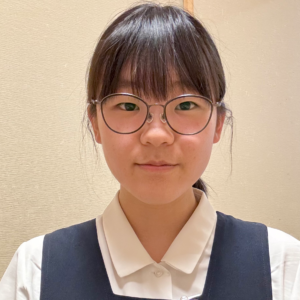 Mao Okabe (Fukuoka Sugoha High School)
Mao Okabe (Fukuoka Sugoha High School)Development of a CNT-based power generator for wearable devices
-
O-02
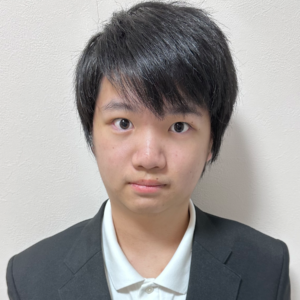 Yuto Deguchi (Isomatsu Junior High School, Higashihiroshima City)
Yuto Deguchi (Isomatsu Junior High School, Higashihiroshima City)Tell educators and supporters how you feel about the world
-
O-03
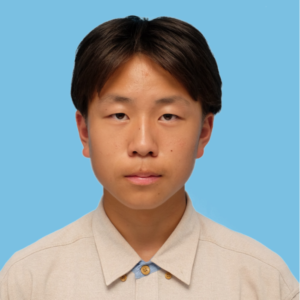 Yuki Ishiba (Nishiyamato Gakuen High School)
Yuki Ishiba (Nishiyamato Gakuen High School)Body color change in the southern shrimp, Pandalus borealis.
-
O-04
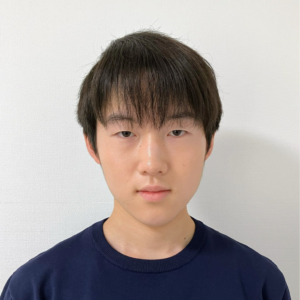 Hotaka Daito (Osaka Seikouin High School)
Hotaka Daito (Osaka Seikouin High School)Synthesis of Poly(vinylpyridine)s with aggregation-induced luminescent moieties
-
O-05
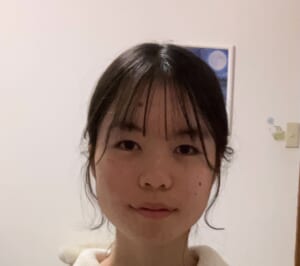 Riko Akutsu (Nara Women's University Secondary School)
Riko Akutsu (Nara Women's University Secondary School)Elucidation of the mechanism of skin damage healing by "stick-on" injections
-
O-06
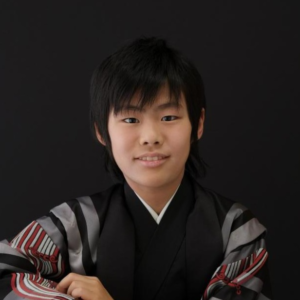 Masayoshi Morioka (Junior High School attached to Okayama University of Science)
Masayoshi Morioka (Junior High School attached to Okayama University of Science)Survive! Pink Grasshopper's Operation Survival
-
O-07
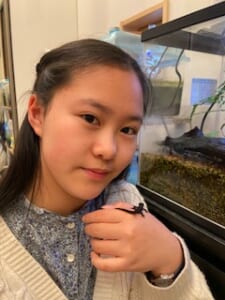 Aiko Yamahata (Takigawa Gakuen Takigawa Junior High School)
Aiko Yamahata (Takigawa Gakuen Takigawa Junior High School)Exploring Conservation and Medical Contributions from the Juvenile Stage of the Red-Bellied Newt
-
O-08
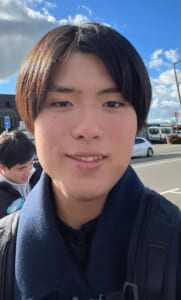 Nao Ishida (Waseda University Senior High School)
Nao Ishida (Waseda University Senior High School)Specific diet and digestion of millworms from the viewpoint of gut microbiota.
-
O-09
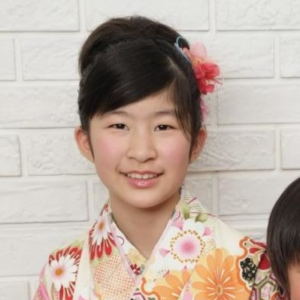 Reikei Morioka (Notre Dame Seishin Gakuen Seishin Junior High School)
Reikei Morioka (Notre Dame Seishin Gakuen Seishin Junior High School)Challenge! The Riddle of the Hime-sama: The Territory and Grooming of the Himegis
-
O-10
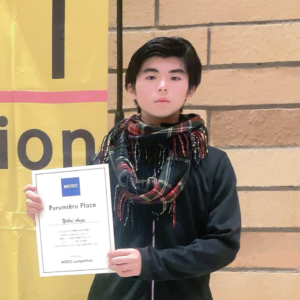 Kyoki Yokoi (Osaka Kyoiku University Senior High School, Ikeda)
Kyoki Yokoi (Osaka Kyoiku University Senior High School, Ikeda)Introduction of Multiple Series with Parameters
-
O-11
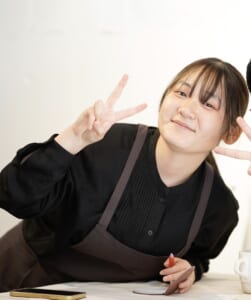 Yukiai Fujiwara (Kamiyama Marugoto College of Technology)
Yukiai Fujiwara (Kamiyama Marugoto College of Technology)Study of artificial incubation method for quail using chicken eggshells
-
O-12
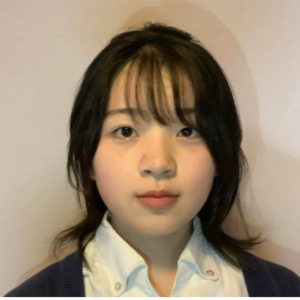 Kona Tao (Takatsuki High School)
Kona Tao (Takatsuki High School)Bacterial Growth in Bottled Beverages
Poster Presentation
*Poster numbers will be released as they become available.
| No. | subject of an address | Name of Representative | belong to |
| P-01 | Power generation capability of gyro generators in daily life | Koichiro Izawa | Nishiyamato Gakuen High School |
| P-02 | Exploring the Shape of Wind Turbine Blades that Can Generate Electricity Efficiently (Part 4) | Keita Sueyoshi | Hatsushiba Tondabayashi High School |
| P-03 | Relationship between the Seebeck coefficient and changes in the internal structure of metals | Sayaka Nagato | Hyogo Prefectural Nagata High School |
| P-04 | Development of ionic thermoelectric devices using CNT electrodes | Jiaoxu Zhao | Fukuoka International School(QFC-SP) |
| P-05 | Utilization and Mechanism of Energy Conversion by Diatoms | Keto Ogi | Yawata Technical High School |
| P-06 | Technology to improve efficiency of dye-sensitized solar cells using plant pigments | Osamu Tamada | Meisei Junior High School |
| P-07 | Investigation of ion species for practical use in graded batteries | Ryuichi Hayakawa | Sakuragaoka High School |
| P-08 | Photothermal generation by titanium nitride nanoparticles: recovery of distilled water from sewage | Shiori Watanabe | Niihama National College of Technology |
| P-09 | Cairo and water plants | Yona Kuraki | Osaka Yuhigaoka Gakuen High School |
| P-10 | How much oxygen does eelgrass photosynthesis produce? | Hideaki Wakabayashi | Kainan Municipal Kamegawa Junior High School |
| P-11 | Potential of Eelgrass Seed Vacuum Preservation | Liao Maeda | Okayama Gakugeikan High School |
| P-12 | Effectiveness of animal-proof fences | Natsuko Terada | Hyogo Prefectural Tatsuno High School |
| P-13 | A Study on the Conservation of Fireflies in Urban Parks | harbor on a piece of land near the shore of a pond | Osaka Prefectural Tondabayashi High School |
| P-14 | Elucidation of the ecosystem of the Mengzifudo Valley through a survey of dragonfly populations. | Yuuki Kato | Wakayama Koyo Junior High School |
| P-15 | Saving stag beetles - a house that protects stag beetles gathered by electric light | Masamichi Morioka | Kibi Kogen Elementary School |
| P-16 | Attractiveness to light coloration in the yellow-bellied stink bug | Rentaro Takahashi | Osaka Meisei Gakuen Meisei Junior High School |
| P-17 | Save the mussels with reed extract. | Haruki Imamura | Seifu High School |
| P-18 | Green water culture using American crayfish | Sakyamuni Ikki | Seifu High School |
| P-19 | Verification of the bio-repellent and adhesion-inhibiting effects of purple juice of ameflagellates. | Nanami Matsunaga | Yamaguchi Prefectural Tokuyama High School |
| P-20 | Elucidation of the synthetic pigment transport pathway in the silkworm, Bombyx mori. | Ayano Sasaki | Koran Girls' High School |
| P-21 | Fluorescence live imaging of reactive oxygen species in vivo | Kaeka Nakamura | Nishiyamato Gakuen High School |
| P-22 | Study on the environment that promotes the differentiation of heterogeneous cells in the rock jellyfish, Pseudopleuronectes americanus | Yukihito Tanaka | Kansai Gakuen Kansai High School |
| P-23 | Development of pseudo-bait using biomass plastic | Haruto Shimizu | Wakasa High School |
| P-24 | Histochemical observation of oral epithelial cells and production of a simple fluorescence microscope | Moe Kawaguchi | Jyoshogakuen High School |
| P-25 | What causes the most growth of Pediococcus bacteria? | Okabe, Ayumi | Okayama Prefectural Kurashiki Amagi Junior High School |
| P-26 | Search for lactobacilli that selectively degrade galactose | Haruho Kakinuma | Soonchun High School |
| P-27 | The "strength" of bacteria learned from penicillin | Yuri Yoshitani | Notre Dame Jogakuin High School |
| P-28 | Differences in the growth rate depending on the type of lactic acid bacteria and the culture medium | Kota Higuchi | Nishinomiya Municipal Nishinomiya High School |
| P-29 | Stable luminescence of luminescent bacteria for water quality testing | Hanaho Suzuki | Ibaraki Prefectural Midorioka High School |
| P-30 | Investigation of the nature of marine bacteria at Kajuen beach and other locations in Japan | Sawahi Mimura | Hyogo Prefectural Ashiya International Secondary School |
| P-31 | Are you painting your face with germs? | Anna Nozawa | Yamawaki Gakuen High School |
| P-32 | Bacteria in the rabbit gut: Exploring the microorganisms that produce nutrients in grass | Aiba Kusumoto | individual |
| P-33 | Improvement of existing antimicrobial products using plant-derived antimicrobial ingredients | Madoka Yamaguchi | Nishiyamato Gakuen High School |
| P-34 | Elevates the apple flavor of the grapara leaf | Kosaka Shinzakura | Jyoshogakuen Junior & Senior High School |
| P-36 | Interplant Communication | Shinya Yamashita | Jyoshogakuen Junior & Senior High School |
| P-37 | Why do the leaves change color in spring? | Chiho Nishida | Takatsuki Junior High School |
| P-38 | A discussion of the effects of plasma-axis stress on plants. | Yuto Emoto | Jyoshogakuen High School |
| P-39 | Research study on the effect of community greening on soundproofing | Yoshima Kikugawa | Jyoshogakuen High School |
| P-40 | Double-wall materials and suppression of the coincidence effect | Ryuiku Ogawa | Okayama Prefectural Kurashiki Amagi Junior High School |
| P-41 | On the stiffness of one-leaf hyperbolic surface structures | Takeharu Yamato | Hyogo Prefectural Nagata High School |
| P-42 | Increases the strength of dilatant fluids | Nao Nakajima | Osaka Prefectural Toyonaka High School |
| P-43 | Relationship of the ball to the wall at the drop of the ball | Midori Katsube | Kurashiki Amagi High School |
| P-44 | Formation of water surface craters and water bouncing up due to falling objects | Eihi Kimura | Osaka Prefectural Senri High School |
| P-45 | Study of water column caused by a ball dropped on the surface of water - Focusing on the relationship between the shape of the ball surface and the height of the water column | Hayama Sato | Okayama Prefectural Kurashiki Amagi High School |
| P-46 | Mysterious power to get along with water? Let's try to make water-repellent surfaces hydrophilic with plasma! | Aoi Kobayashi | Sakai City Minami Yashimo Junior High School |
| P-47 | Calculation of the angle for water flow over the crown of the sphere in only one direction | Takei, Minato | Okayama Prefectural Kurashiki Amagi Junior High School |
| P-48 | How to slide down the slide faster | Shota Kuromoto | Nishinomiya Municipal Nishinomiya High School |
| P-49 | How to cleanly cut glass with scissors | Sojiro Ishikawa | Kurashiki Amagi Junior High School |
| P-50 | Counting Molecules: The Mystery of Brownian Motion | Kohshi Tamiya | Sakai Municipal Miharadai Junior High School |
| P-51 | Solving the problem of congestion at crosswalks due to the flow of people during events | Seiichi Kondo | Shibaura Institute of Technology High School |
| P-52 | Prevent collisions on stairs | Yuuki Yuri | Okayama Prefectural Kurashiki Amagi High School |
| P-53 | The Need for Music in Drama and Film | KINOSHITA Kino | Tokiwamatsu Gakuen High School |
| P-54 | Effects of machine-played and human-played music on learning concentration. | Ichika Butsubara | Iizuka High School |
| P-55 | The Effect of Contemporary Music on Concentration During Study | Shu Aimoto | Osaka Meisei Gakuen Meisei High School |
| P-56 | Development of an application that automatically composes music using alphabetical sequences | Hiroto Wakasa | Okayama Kyozan Junior High School |
| P-57 | Ten Puzzle Analysis | Yousei Inaba | Fukui Prefectural Wakasa High School |
| P-58 | Impact of the relevance of the few-shot example | Tomonori Sawada | Osaka Meisei Gakuen Meisei High School |
| P-59 | Creating games that make learning math fun | Kei Kinugasa | Okayama Kyozan Junior High School |
| P-60 | The Japanese Are Not Kind! ~Considering New Donations from a Cultural Perspective~. | Ayana Takahashi | Tokiwamatsu Gakuen High School |
| P-61 | Creation of an application to provide an overview of weather pain and increase awareness | Kai Takemasa | Okayama Kyozan Junior High School |
| P-62 | Creating a Disaster Evacuation Game Using Programming Night Roads are Dangerous! | Hisashi Rokugawa | Wakayama Higashi Junior High School |
| P-63 | New 3D seismic isolation system with LM Guide | Ayumu Yamashita | Osaka Prefectural Toyonaka High School |
| P-64 | Creation of assistive tools using Spresense | Rihito Ueda | Doshisha International Junior High School |
| P-65 | Devising a walker that can make disabled dogs happier. | Yori Umetsu | Tokiwamatsu Gakuen High School |
| P-66 | Effects of Dynamic Stretching and Supporter Wearing on Exercise Performance | Nakayama Daichi | Mita Gakuen High School |
| P-67 | Improve athletic performance by wearing insoles | Tsubasa Zoga | Osaka Meisei Gakuen Meisei High School |
| P-68 | Relationship between ball striking angle and distance in softball | NAKANO MOTTA | Okayama Prefectural Kurashiki Amagi Junior High School |
| P-69 | We want to name asteroids! ~The path to obtaining a provisional code | Shotaro Okimoto | Junior High School Attached to Okayama University of Science |
| P-70 | Relationship between solar flares and cosmic ray arrival frequency | Issei Yamakawa | N High School |
| P-71 | What's Material? | Blue Bookmark Name | Okayama Prefectural Kurashiki Amagi High School |
| P-72 | Fault survey and topographic change prediction in Kawanishi by model experiment | Harumichi Nakajima | Prefectural Itami High School |
| P-73 | Investigation of optimal conditions for organic matter decomposition using titanium dioxide | Reina Takahashi | Sakuragaoka High School |
| P-74 | Conditions of acidic substances suitable for expansion cooking | Koichiro Araki | Okayama Prefectural Kurashiki Amagi Junior High School |
| P-75 | Improved melting point in chocolates made with beef tallow | Airi Nakatsuji | Hyogo Prefectural Takarazuka Kita High School |
| P-76 | Relationship between the way colors change and temperature and pH in traffic signal responses. | Saya Yoshida | Sacred Heart Academy Secondary School |
| P-77 | Reuse of acrylic sheets | Yusho Yamazaki | Kobe Municipal High School of Science and Technology |
| P-78 | Easy collagen at home! Effective use of discarded scales | Yasuhito Matsuoka | Okayama Gakugeikan High School |
| P-79 | How to Go from Bamboo Harm to Bamboo Gain | Yoichi Kanada | Kansai Soka High School |
| P-80 | 2050 All waste to be a resource - Biofuel from hair and pet hair | Murakami Comeya | Rakunan High School |
| G-01 | Remoulding plastic at a lower temperature in an attempt to reduce toxic gas emissions | Yong Heng Gary Lee | Nexus International School (Singapore) |
| G-02 | SEAWEED-BASED BIOPLASTIC | Zaiton binti Abdullah | MRSM MUAR JOHOR |
| G-03 | Carbon capture and selectivity capacity of cellulose aerogels obtained from cacao (Theobrama cacao L.) pod husks. | Ariette Jezka R. Villanueva | UP High School in Iloilo |
| G-04 | Chitin-Synthesized Fabric | Kerubim Iana Pauline Senobin | UP High School in Iloilo |
| G-05 | Assessing the prevalence of microplastics in fish sold in local markets in Iloilo | Keith Jan Matthew M. Abad | UP High School in Iloilo |
| G-06 | Efficacy of Green Mussel (Perna viridis) Shell Scraps as an Adsorbent in Crude Coconut Oil Refinement | Reese Klyde Malaki | UP High School in Iloilo |
| G-07 | Calabash Sunscreen | Abbie Jessica Cacho Leigh | UP High School in Iloilo |
| G-08 | Raw Kapok Fiber (C. pentandra) and Dried Luffa Sponge (L. aegyptiaca) as Composite Materials for Natural Oil Adsorption | Theodore Alexis Juliano | UP High School in Iloilo |
Oral Presentations Judges
-
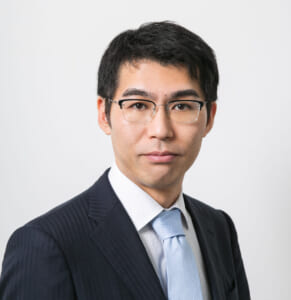 Hiroyuki Takahashi
Hiroyuki TakahashiDirector, Knowledge Foundation Research Center, Liverness, Inc.
MORED. from Yokohama City University in 2009. D. in Science, he has been mainly engaged in creating new research projects between industry and young researchers, including the launch of the "Liberalness Research Fund" for young researchers under 40 years old. He has also been involved in the creation of "super interdisciplinary academic societies," a place where individuals can combine their knowledge, skills, and passion for problem solving to create new knowledge without being bound by the framework of academia, and the launch of real laboratories for knowledge manufacturing, among other activities to create seeds for research and development. -
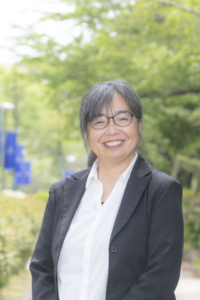 Naoko Kishimoto
Naoko KishimotoProfessor, Faculty of Engineering, Kwansei Gakuin University
MOREAfter graduating from the Department of Archaeology, Faculty of Letters, Kyoto University, and the Department of Aerospace Engineering, Faculty of Engineering, Kyoto University, and obtaining a doctorate in Aerospace Engineering from the University of Tokyo, he worked as an invited researcher at the Institute of Space and Astronautical Science, JAXA, and as a JST PRESTO Researcher at Kyoto University, and as a professor at the Department of Mechanical Engineering, Faculty of Science and Engineering, Setsunan University before assuming his current position in April 2023. He is engaged in research to analyze the form and properties of space structures that function in orbit and on planets, as well as research on new and interesting structures. His main themes include proposals for modular and inflatable structures, application of forms found in nature such as marine plankton and insect hatching to space structures, and research on morphing wings that can autonomously change their shape. -
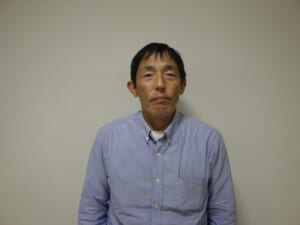 Koichi Okuda
Koichi OkudaChief Researcher, Biomass Innovation Center, Research and Development Division, Daicel Corporation
MOREBorn in Okayama, Japan in 1966, Mr. Kurokawa graduated from the graduate school of Ehime University (master's degree) in 1992, and joined Daicel Corporation (then Daicel Chemical Industries, Ltd.). After joining the company, he was sent to a doctoral course at a graduate school in Japan and obtained a doctorate (engineering). In 2010, he was assigned to the Otake Plant in Hiroshima Prefecture, where he inspected products and manufacturing processes throughout the plant and was involved in quality control and quality assurance for organic chemical products. He returned to Himeji City, Hyogo Prefecture, as a representative of the evaluation and analysis department, and worked to solve and identify issues throughout the company from the aspect of evaluation and analysis. 2022 to present. -
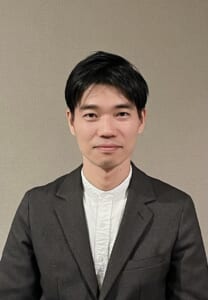 Yasuhisa Anekawa
Yasuhisa AnekawaWest Japan Business Promotion Department, Project Business Division, Total Media Development Institute Co.
MOREGraduated from the Graduate School of Art and Design, Kyushu University. Since joining the company, as a project manager, he has been involved in the development of diverse cultural facilities such as science museums, museums, zoos, and corporate museums. Especially in the field of science museums, he has developed interactive exhibits and hands-on content that can be enjoyed by both children and adults, and designed exhibition spaces where visitors can encounter the fun and surprise of science. Through collaboration with local creators and research institutions, he is also involved in the creation of new future-oriented facilities. -
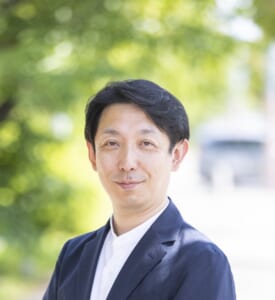 Tomohiro Aoki
Tomohiro AokiExecutive Director, Benesse Children's Foundation
MOREWhile at Benesse Corporation, he worked with schools and local governments throughout Japan. While feeling that there are differences in educational opportunities in different regions, he has met people who are working to eliminate these disparities. Currently, as the Executive Director of Benesse Children's Fund, she is working with NPOs, schools, corporations, and local governments across Japan to help realize "a society where children with a future can expand their own potential in a safe environment where they can engage in learning. He also serves as director and supervisor of several other NPOs, including Chance For All, a non-profit organization, and the Diverse Learning Project. -
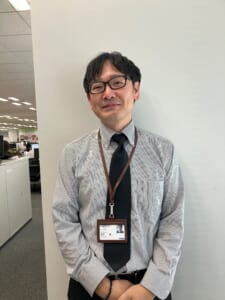 Kazuma Suda
Kazuma SudaManager, Cell Technology Development Group, Regenerative Medicine Research Planning Department, Rohto Pharmaceutical Co.
MOREHe joined Rohto Pharmaceutical in 2001 and was assigned to the Research and Development Department. Initially, he was engaged in formulation development, device development, and pharmacological evaluation of ophthalmic drugs. From 2006, he engaged in basic research on hair and skin aging, and developed pharmaceuticals and functional cosmetics. Since 2017, he has been promoting research on the development of next-generation regenerative medicine technology using adipose-derived mesenchymal stem cells. His career has included experience in a wide variety of fields, including pharmaceuticals, functional foods, and regenerative medicine. -
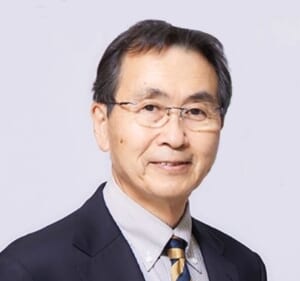 Masao Yamawaki
Masao YamawakiProfessor, Faculty of Science and Engineering, Yamato University
MORED. in Electronic Engineering from the Graduate School of Engineering, Osaka University. He studied semiconductor design and manufacturing technology at the LSI Research Laboratory of Mitsubishi Electric Corporation, and later worked in the Business Division and Corporate Planning Department. After about 30 years of service, he taught electronics and other fields at the Department of Electrical and Computer Engineering, Kure National College of Technology, and at the Faculty of Science and Engineering, Daiwa University. His current research interests include measurement technology that uses microcomputers and sensors to measure biological information, and research and development of 3D printers for special materials. At Yamato University, he is working with students in the "Monozukuri Kobo" (manufacturing workshop) on projects such as EV cars, microcomputer-controlled robot cars, and rocket launches. In junior high school, he was a member of the science club and immersed himself in research.
keynote speech
Lectures for visiting middle and high school students and teachers will be given by researchers from universities and other research institutions engaged in advanced research, as well as by entrepreneurs of R&D ventures.
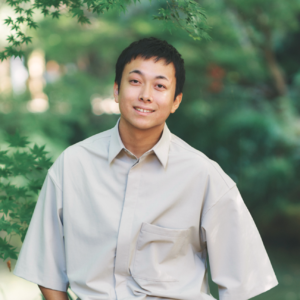
Mr. Kohei Ito
Representative Director, BIOTA Corporation
Lecture Title
Realization of a Microbiota Friendly City.
I am currently working to realize a healthy and sustainable community through the symbiosis of microorganisms and humans.BIOTAI am running a company called When I was in high school, I was given the opportunity to do research as a special research student at a research institute at Keio University, and from there I have continued to face the research I love. I will talk about what I find fascinating about urban microbiology research and how I can continue to do what I love for a long period of time.
.
Graduated from Keio University. From high school, he was engaged in genome analysis of human commensal bacteria as a special research student at the Institute for Advanced Biosciences, Keio University. As an undergraduate, he engaged in metagenomic analysis of urban microbial communities. After graduating from the university, he founded BIOTA Inc. and has been engaged in urban design business to increase microbial diversity through architecture, landscape design, and material development, with a focus on microbial research. On a personal basis, he creates and exhibits speculative design works based on the theme of circulation.
Special Session
Go To Asia : A New Experience
Planning Partner: Riverness Inc.
Subject: Students
This session will bring together the teams that won outstanding awards at the Science Castle Asia Competition held in Malaysia this October. Students from Malaysia, Singapore, and the Philippines, respectively, will share their exciting experiences from the Asian competition in this session. I want to interact with middle and high school researchers from Southeast Asia in English! Want to challenge yourself at the Asian Games? If you are interested in this event, please come and join us.
special project
A special program featuring workshops for middle and high school students will be held from 16:00-16:45. Pre-registration is available, so please register now.
Moving the Heart. - Global research careers that move the heart.
Planning Partner: Rohto Pharmaceutical Co.
Subject: Students
What kind of world opens up when you transcend national borders through research, researchers from overseas working for Rohto, the Malaysian team that won the Rohto Prize at the Science Castle Asia Congress in October 2024, and "the next generation, the fastest institute in the world to work on world-changing research". The appeal and possibilities of a global research career will be shared with members of the ADvance Lab.
The Mirai of PLA, Watashi and the Earth Venue -Proposal from Singapore
Planning Partner: Riverness Inc.
Subject: Students
Plastics are used for various purposes in our surroundings. This is because we have created plastic materials with properties suitable for various uses through research and development. How should we deal with plastic materials? Let's think about the future of the earth together based on the presentation by Singaporean high school students!
Booth Planning
During the poster session (14:00-15:45), booths for the following projects will be set up at the same venue
Co-creating the Future of the Maritime Industry with the Next Generation "Imabari Shipbuilding Umitomo Ship Project
Planning Partner: Imabari Shipbuilding Co.
Target: Students and teachers
Maritime transport accounts for 99.6% of Japan's trade volume, which is supported by industries such as shipbuilding, marine industries, and shipping, collectively known as the maritime industry. Imabari Shipbuilding is launching the "Umitomo Ship Project" to co-create the future of the maritime industry with the next generation. Ahead of its full-scale launch in the next fiscal year, Imabari Shipbuilding is currently developing a four-month exploration program with RIVANES through the production of a 600mm-long container ship model. At this booth, we will introduce the science related to ships that can be learned through the program, as well as educational materials under development.
If you were to utilize a science museum, what would you want to do?
Planning Partner: Total Media Development Institute, Inc.
Target: Students and teachers
Many of you junior and senior high school researchers may have enjoyed the experience of visiting a science museum when you were in elementary school. Although the majority of visitors are elementary school students, we believe that science museums should be updated now that more and more junior and senior high school students are involved in scientific research. If junior high and high school students could use the science museum to its fullest, we would love to discuss what kind of place they would like it to be.
What is the Eco Chill Survey? Think about the environment around you and your health!
Planning Partner: Ecotil Research Core Center, National Institute for Environmental Studies
Subject: Students
Have you ever heard of the "Eco-Child Study" in which as many as 100,000 pairs of parents and children in Japan are participating? This is a study to regularly check the health status of babies from the time they are in their mothers' tummies and to clarify how the environment around them affects their growth and development. We are currently developing a role-playing game to show the appeal of this research! We would love to hear your ideas for the game as well as your usual thoughts on health at the booth!
Nippo's 3D printers give shape to your spirit of exploration and curiosity.
Planning Partner: Nippo Corporation
Target: Students and teachers
3D printers are used as a matter of course in schools overseas. In this exhibition, you will be the first to experience the appeal of 3D printers! We will introduce research cases using 3D printers for junior and senior high school students, and curriculum examples for school teachers to use in their classes. Please visit our booth!
Challenge yourself to research the ocean and aquatic environment with the Marine Challenge Program!
Planning Partner: Japan Advanced Science and Technology Education and Human Resources Research and Development Organization
Subject: Students
The Marine Challenge Program is a program to support teenagers who want to challenge themselves in all kinds of research related to the ocean and aquatic environment. Whether you are a first-time researcher or already working on your own research, you are welcome! We will support your research with research funding and mentoring by research coaches. At this booth, we will offer advice on planning a research theme and introduce the Marine Challenge Program. Please let us know your interests in the sea, such as biology, environment, manufacturing, marine debris, etc!
NEST LAB: Talent Search Institute for Elementary and Junior High School Students. Turn your home into a laboratory!
Planning Partner: NEST EdLAB Inc.
Target: Students and teachers
NEST LAB. is an online research school for elementary and junior high school students with the theme of "Create knowledge by pursuing what you love. Through "NEST education" based on RIVANES' 20 years of know-how, we discover and develop the talents of each child. Let's explore "what no one in the world knows" and "what no one has solved yet" with instructors with master's and doctoral degrees and fellow students from all over the country who want to master their favorite subjects!
Shedding Light on Nameless Troubles SC Research Fund Benesse Children's Fund D&I Award
Planning Partner: Benesse Children's Foundation
Target: Students and teachers
Benesse Children's Fund supports research by junior and senior high school students on themselves to realize "a society in which children with a future can expand their potential in a safe environment where they can engage in learning. The Foundation also continues to support the activities of the Science Castle Research Fund in cooperation with LIVERNESS to encourage each student to take a step forward to change the world. If you are interested in "any kind of development and research focusing on your own characteristics and minorities," please stop by our booth!
Partners
Science Castle 2024 Osaka-Kansai Partner Companies
Information for Participants
Online Abstracts
A ribanes ID is required to view the site.
Information for all participants
Parking Lot
There is no parking available at the venue, Daiwa University. Parking on the university campus or in adjacent commercial facilities, or getting in and out for pick-up or drop-off, is strictly prohibited. Please use public transportation to come to the venue.
Visiting by group bus
If you arrive by an individually arranged bus, you may board and disembark within the university facilities, but we will not be able to accommodate buses waiting on the university campus. Please check with the security office next to the main gate before coming to the event to ensure that students are able to get on and off the bus.
Lunch on the day of the convention
The University cafeteria is not available. Bringing your own lunch is recommended. During the lunch hour, you may have lunch in the arena, which will be the main venue. Please use the auditorium and the second floor bleachers. You may also have lunch around campus, but please return in time for the afternoon program.
Inquiries about this event
Science Castle is held at a facility rented from Daiwa University. If you have any questions about the event, please contact the secretariat (Liverness Co., Ltd.), not Daiwa University, which is the venue. (Inquiries: Mail: ed@Lnest,jp / Tel: 06-6125-5622)
